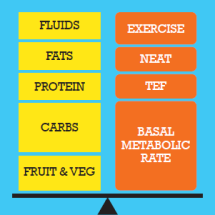Do fitness calorie counters work?

Most fitness equipment and monitors these days will give you an estimate of your calorie burn during a workout. This week I’d like to explore how accurate they are and whether you should focus on calories at all.
How do they work?
Well, that depends, and it’s complicated. To get anywhere near a bespoke estimate, these devices will ask you for your gender, height, weight and activity level. From these data points, an algorithm will be generated – in combination with heart rate – to provide you with an estimate. A taller, heavier, inactive person will use more energy during exercise (particularly weight-bearing ones) than their shorter, lighter, active counterparts. Also, it makes sense that a higher heart rate means a higher intensity workout resulting to more calories being burnt. Do this over a prolonged period of time and voila, more calories.
Are they accurate?
Even with all the above taken into account the answer is, ‘so-so’. Estimates suggest that they can be within 10-20% accurate, however,
Heart rate can be influenced by so many variables that it makes it tough to give an exact estimation.
For example, if I drink a coffee before exercise or am more stressed and record a higher heart rate, does that mean I burn lots more calories as the app suggests? Probably not. If I exercise an hour after my heart rate lowering medication vs beforehand, does that mean lots less calories? Also, probably not.
I’d therefore suggest extreme caution when it comes to interpreting a calorie readout, and even more so, if you haven’t entered the above metrics.
Should we pay attention?
Regardless of accuracy, the outcome of exercise isn’t about using calories, it’s about creating a specific adaptation, whether that be increased strength, muscle mass, or cardiovascular fitness.

If weight loss is important, then these adaptations in time will help you achieve this. For example, developing muscle will increase your metabolic rate (the number of calories you use at rest) which in turn will help you lose fat and if you’re fitter, you’ll naturally do more day to day as daily tasks become easier.
The number one determinant of daily energy expenditure is metabolic rate followed by NEAT*
*General daily movement that isn’t structured exercise e.g. standing or steps
So, focusing on these 2 are more valuable than exercise itself. Furthermore, if you’re simply working out to save yourself some calories to spend on food then, you’ll probably be quite depressed with how tough it is to burn 500 calories during exercise vs how easy it is to consume them. Doing a high-intensity workout to burn extra calories is therefore the wrong way to do it as you’re likely to feel more tired and depleted afterwards, be less likely to move, and probably reach for a bit more food as you need it or as a reward.
Take-homes:
The accuracy of estimating calories during exercise is fairly poor. Don’t judge the quality of a workout based on how tired you feel at the end or how many calories you use. Instead, focus on the quality of what you’re doing, whether you’re progressing over time and are you achieving your goals.
